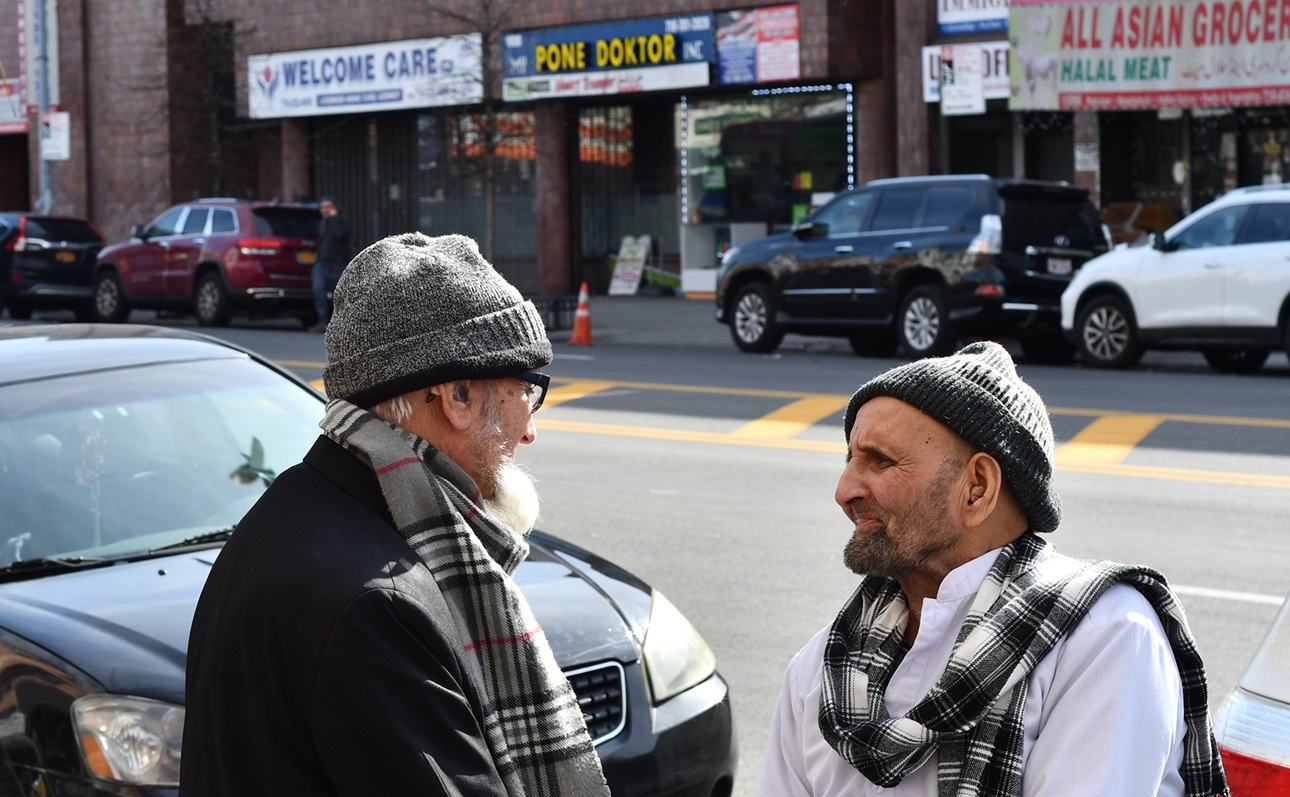Some Muslim Immigrants Distrust Census in Trump Era

Mohammad Razvi, founder of the Council of Peoples Organization, in the organization’s headquarters in the Little Pakistan section of Midwood, Brooklyn. Razvi said the immigrant community faces a census undercount next year without more outreach. The Pew Charitable Trusts
Connecting state and local government leaders
Arabic-speaking immigrants are wary of answering questions from government employees, including census workers, focus groups have found.
This story was originally published by Stateline, an initiative of The Pew Charitable Trusts.
BROOKLYN, N.Y. — This two-block commercial strip of the Midwood neighborhood features a mosque, halal markets and restaurants, and tailor shops with colorful shalwar kameez pantsuits, all catering to the Pakistani immigrant community wedged between a Jewish neighborhood and a Mexican enclave on Coney Island Avenue.
Fear and distrust of government questions have a long history here. A local advocacy group, the Council of Peoples Organization, originally the Council of Pakistan Organization, got its start in 2002 as a liaison among Pakistani immigrants, the FBI and other authorities after the terrorist attacks of 9/11.
In the past two years, anti-Muslim violence and the Trump administration’s restrictions on travel from some Muslim-majority countries have renewed those fears and tensions—and created new challenges for community organizations trying to get people to participate in the 2020 census.
For advocates and public officials, a complete count is necessary to maximize the area’s political representation and federal funding. But many immigrants from Muslim-majority countries such as Pakistan are wary. For many, U.S. Census forms recall registration requirements imposed by authoritarian regimes in their native countries—not to mention the “special registration” that the U.S. government imposed on some immigrants after 9/11.
“After 9/11, we lost about a third of our community. People were being harassed and detained. People were hired to spy on us. A lot of people just picked up and left and went to Canada or Europe,” said Kashif Hussain, a 41-year-old Pakistani-born engineer who runs the Pakistani American Youth Society in Midwood.
The neighborhood only now has recovered most of its immigrant Muslim population, Hussain said. But people still have a hard time believing the United States wants to count them to help distribute funds that would help them.
“People look around and say, ‘Where is this money?’ That’s how they think,” said Hussain. “People just hear the hateful rhetoric from the government and think nothing good is going to come out of it in the Trump era, and they look at everything that happens with a lot of suspicion.”

Fearful in Focus Groups
The Census Bureau’s task next year is to count all U.S. residents, no matter their background or citizenship.
But when the bureau held focus groups in Michigan composed of Arabic speakers, it found that immigrants were wary of answering questions from the government, even from census workers, and assumed their answers would be shared with other government agencies. Even recruiting Arabic speakers for the focus groups was more difficult than it was for other groups, a 2018 Census Bureau report said.
About 4.6 million U.S. residents have roots in majority-Muslim countries, though many are not Muslims. Three-quarters are U.S. citizens, and 41% are American-born.
There are more than 1.2 million Arabic speakers in the United States, two-thirds of them immigrants.
“The immigrant is not going to trust the census employee when they are continuously hearing a contradictory message from the media every day threatening to deport immigrants,” one member of an Arabic focus group said, according to a 2017 Census Bureau report.
People of Middle Eastern and North African descent, a group that includes many immigrants from Muslim-majority countries, also expressed lack of confidence in the confidentiality of information they might give to the Census Bureau, according to another census report in January 2019.
“Every single scrap of information that the government [gets] goes to every single intelligence agency, that’s how it works,” said one participant in a Middle Eastern-North African focus group for English speakers, according to the report.
Such responses indicate that a new citizenship question, which is facing a legal challenge that has reached the U.S. Supreme Court, could affect Muslim immigrant participation, said William Frey, the demographer at the Brookings Institution who wrote a 2018 report on census participation issues.
“In light of the current administration’s significant pushback against immigrants, especially Muslims and other people of color, the census could become a divisive, politically charged exercise,” Frey wrote in the report, adding that an undercount of such people would “undermine the very democracy [the census] was intended to uphold.”
Brooklyn, Queens and Staten Island together have almost a quarter-million immigrants from Muslim-majority countries, about 4% of the total population in those boroughs. That makes them laboratories for strategies to avoid an undercount.
Some Virginia and Maryland suburbs of Washington, D.C.; Macomb County, Michigan, north of Detroit; and Fort Bend County in suburban Houston also have high percentages of immigrants from Muslim-majority countries. Predominant countries of origin range from Pakistan in Brooklyn, Houston and parts of Virginia, to Afghanistan, Bangladesh, Egypt, Iraq and Iran in other areas.
The American Community Survey data used to count immigrants includes the largest Muslim-majority countries, but not some smaller ones or the Palestinian territories.
Like the Arabic speakers who participated in the Michigan focus groups, people are nervous in Midwood’s Urdu-speaking Pakistani community, as well as among recent arrivals from Uzbekistan, who speak the Uzbek language.
“Our clients see the news. They hear the term ‘Muslim ban’ and they know that Trump is president and the administration wants them out of here,” said Ryan Campbell, a staff attorney who counsels immigrants at Midwood’s Council of Peoples Organization.
“We can tell them that it’s all confidential, that the census won’t share this information, but I’m not sure I would believe it if I were in that position.”
The Trump administration’s travel ban on some Muslim-majority countries doesn’t include Pakistan. Nevertheless, many Pakistanis in Midwood view it as a sign of government hostility toward Muslims. It has been particularly hard on immigrants who still have close family ties to the old country, Campbell said.
“I just spoke to a woman from Yemen who has to make the wrenching decision whether to visit her dying mother, and then maybe not being able to get back,” said Campbell. The latest version of the ban affects Iran, Libya, Somalia, Syria and Yemen, as well as North Korea and Venezuela.
Mohammad Razvi, the Pakistani former shopkeeper who founded the Council of Peoples Organization in 2002, said he thinks Midwood was undercounted in 2010 despite outreach efforts.
During the 2010 census, more than 30% of Midwood households failed to respond to mailings, requiring costly and fallible follow-up interviews, according to HTC 2020, a visualization of response rates by the Center for Urban Research at the City University of New York. The center rated Midwood as one of the nation’s hardest-to-count areas.
The Council of Peoples Organization wants to avoid an undercount so it can secure the maximum federal funding for community programs, such as a senior center and a new halal Meals on Wheels program. To help achieve that goal, the council will make a plea for census participation at all public events, from Pakistan Day celebrations to ceremonial iftar meals during Ramadan, which starts May 5.
Different Cultures and Faiths
But not all immigrants from Muslim-majority countries, or those with roots there, have the same suspicion of authorities.
Los Angeles County has the largest number of immigrants from Muslim-majority countries—more than 230,000, almost half of them from Iran. But Iranian immigrants are more likely to have left Islam than other nationalities, according to the Pew Research Center. Many secular Iranians fled the country after the Iranian Revolution in 1979, according to a 2017 survey by the research center. (The Pew Charitable Trusts funds both the Pew Research Center and Stateline).
“This diverse demographic includes different ethnicities, cultures and faiths,” said Diana Crofts-Pelayo, a spokeswoman for California Complete Count, a state-funded $154 million outreach program.

Ali Akbar Mahdi, a sociologist at California State University, Northridge, and a former editor of the journal Iranian Studies, said most Iranians who came after the revolution will happily fill out census forms next year.
“They are going to cooperate,” he said. “They are grateful that this country gave them a place to stay, even though they do have to deal with the American public and the media that often assumes that, if you’re from the Middle East, you must all be the same.”
Even in Midwood, some see tensions easing with time and the arrival of more immigrants from Muslim-majority countries.
“9/11 was a long time ago,” said A.C. Razvi, a Pakistani immigrant and store owner who arrived in the United States as a child 38 years ago. He is Mohammad Razvi’s brother.
But A.C. Razvi said there are frequent reminders that some people remain hostile to Muslims. He cited a recent unexplained attack by a stranger on a woman wearing a hijab on the street in Midwood.
“I don’t even have the words to describe it,” Razvi said of the incident. “It’s just sad.”

NEXT STORY: Surprise Medical Billing: Some States Ahead of Feds


